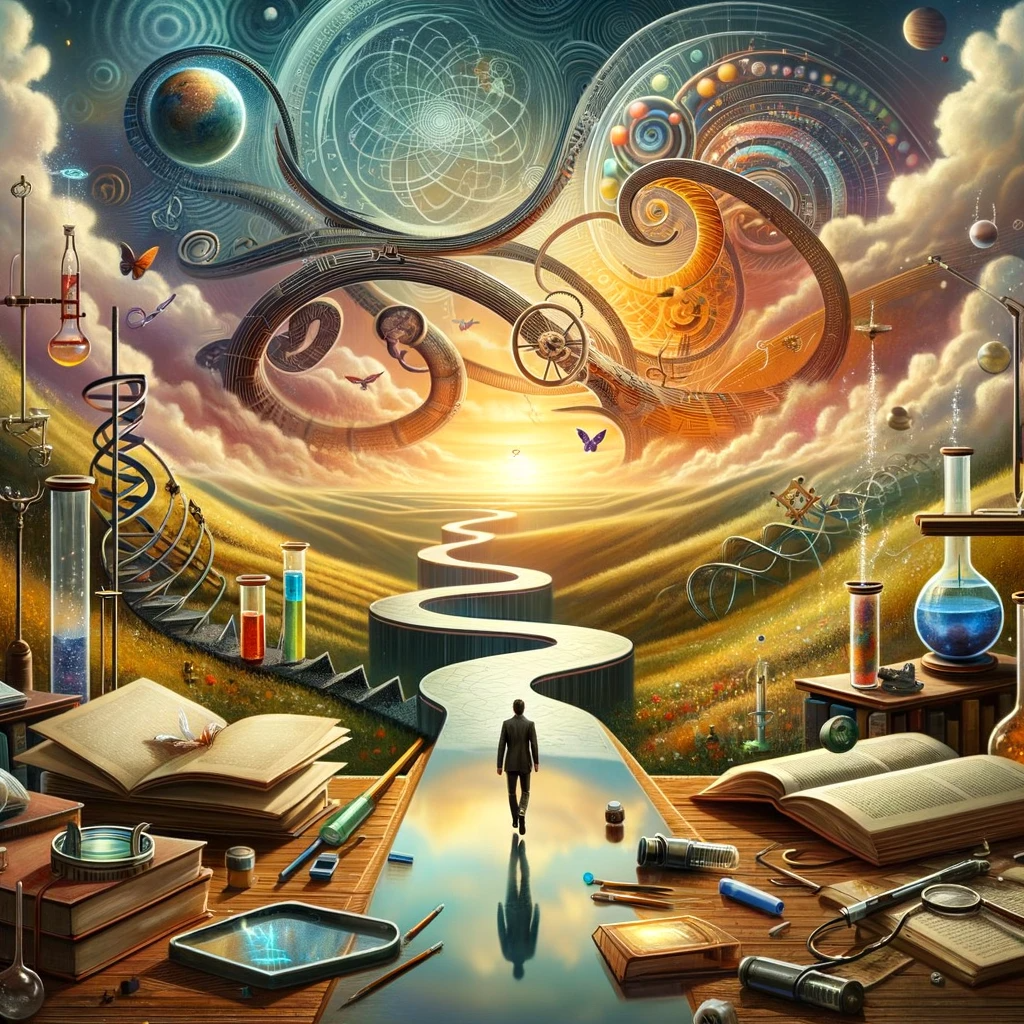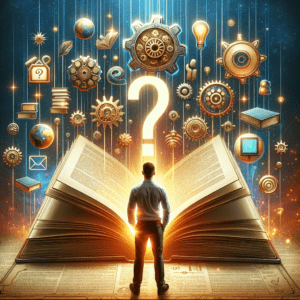A Simple Path Towards Authenticity: A Scientific Manifesto For Awareness Through A Grounded and Rational Approach
Introduction
In the pursuit of a higher quality of existence, two fundamental principles emerge as essential: awareness and taking care of the body1. These principles are not mere concepts; they are the ultimate ingredients for transcendence in any spiritual or philosophical tradition2. In our pursuit of a higher quality of being, we often find ourselves entangled in complex philosophies, religious doctrines, and intricate rituals. But what if the path to transcendence is simpler than we think? This manifesto presents a logical and scientific exploration of these principles, aiming to provide a rational framework for personal and collective growth3. Allow me to share my thoughts on this profound journey, thoughts that have been nurtured through contemplation, observation, and a deep connection with the unbiased nature of existence.
I. Awareness: The Foundation of Authenticity
Understanding Consciousness
Awareness of yourself and the world around you cultivates authenticity4. It’s a continuous pursuit to align your being with the truth of existence5. Emotions like empathy and compassion are vital for emotional intelligence, which is essential for any type of transcendence6. The deeper awareness you practice, the more intelligent, empathetic, and positive you become, connecting more with others and contributing to society7. Awareness is not just a word; it’s a way of life. It’s about understanding ourselves, our emotions, our thoughts, and the world around us. It’s about aligning our being with the truth of existence, cultivating authenticity and strengthening interconnection with everything.
The Benefits of Mindfulness
Mindfulness, a practice rooted in awareness, has been scientifically shown to reduce stress, improve mental clarity, and enhance well-being8. By cultivating awareness, we align ourselves with a more authentic and compassionate way of living, building a stronger relationship with existence, the universe, and the essence of everything—love9. Imagine peeling back the layers of existence, uncovering the raw, authentic essence of who you are. Imagine feeling the pulse of the universe, recognizing the interconnected network of life. This is the power of deep awareness.
Awareness and Cognitive Function
Awareness helps in recognizing and overcoming cognitive biases, leading to more accurate perceptions and judgments10. It fosters understanding of one’s identity, reduces ego-driven behaviors, aids in identifying psychological triggers, and promotes healthier relationships11. Mindfulness practices are therapeutic in healing trauma and managing stress12. Awareness supports the recognition and healing of codependent behaviors and addictions, enhances critical thinking, and is key to emotional regulation13.
II. Taking Care of Your Body: A Scientific Perspective
The Body-Mind Connection
Taking care of your body is necessary for being healthy enough to receive universal wisdom and energy14. Without healthy eating, sufficient sleep, and positive energy, clarity within the mind to reach enlightened states becomes elusive15. When you take care of your body through exercise, diet, and sleep, you prime yourself for receiving higher truths of existence and transcending into a higher state of being16. Our bodies are not mere vessels; they are conduits of the electricity necessary for cognitive functionality. They are the machinery that allows us to receive universal transmissions of wisdom and energy. They enable us to emit positive energy into the world.
Holistic Well-being
Many religions encourage treating the body like a temple and living a positive life that cultivates love and compassion17. True authenticity, cultivated by advanced awareness and body care, transcends these complexities, representing universal principles for human flourishing18. Eating healthy, sleeping enough, and cultivating positive energy are not just good habits; they are essential practices for clarity of mind and enlightened states of being.
III. Alignment with Core Teachings: A Universal Resonance
The principles of awareness and body care resonate not only with modern scientific understanding but also with various philosophical and religious traditions across cultures and history19. These two ingredients, awareness and taking care of your body, represent so many different religious approaches and concepts. They encapsulate the essence of being a “good person” and treating the body like a temple. They encourage us to live a positive, benevolent life that cultivates love, compassion, and empathy for others. Forget the complicated rules and the worship of gods. True authenticity, cultivated by advanced awareness, and taking care of your body are the ultimate ingredients necessary for any kind of transcendence in any religion.
- Buddhism: Mindfulness and awareness are central to Buddhist practice, emphasizing the cultivation of insight and compassion20. The body is seen as a vessel that must be cared for to support spiritual growth21.
- Hinduism: The practice of yoga and meditation in Hinduism emphasizes self-awareness and the union of mind, body, and spirit22. Proper care of the body is considered essential for spiritual development23.
- Christianity: The Christian tradition teaches that the body is a temple of the Holy Spirit, emphasizing the importance of treating it with respect and care24. Compassion and love for others are also central values25.
- Islam: In Islam, the body is considered a trust from God, and taking care of it is a form of worship26. Awareness and mindfulness are encouraged through practices like prayer and reflection27.
- Ancient Greek Philosophy: The idea of “know thyself” reflects the pursuit of self-awareness, while the concept of a balanced life aligns with taking care of the body28.
- Taoism: Taoist practices emphasize living in harmony with the Tao, or the natural way of things, which includes a focus on self-awareness and the balance of body and mind29.
- Judaism: Jewish teachings emphasize the importance of taking care of the body as a way to honor God30. Mindfulness and reflection are also valued in the pursuit of wisdom and understanding31.
- Contemporary Mind-Body Wellness: Modern wellness practices recognize the interconnectedness of mind and body, promoting holistic well-being through mindfulness, exercise, and nutrition32.
IV. A Vision Based on Evidence
Authenticity and Societal Norms
Authenticity, fostered by awareness, is essential for personal integrity and societal well-being33. It helps in recognizing and challenging societal norms that may be harmful, manipulative or limiting34. It supports the development of a more compassionate and empathetic society, grounded in evidence-based principles35.
The Fluid Nature of Modern Life
In the fluid and complex nature of modern life, the principles of awareness and body care provide a stable foundation for navigating change and uncertainty36. They support mental resilience, adaptability, and a deeper connection with oneself and others37. They are the notes in a universal symphony, resonating with love, compassion, and empathy. These elements are necessary to have the non-judgmental perspective required for advanced vital intelligence.
The Power of Focus
The ability to focus and direct attention is essential for cognitive function, creativity, and well-being38. Mindfulness practices that cultivate awareness enhance the ability to enter a flow state of mind, which is associated with improved mental health39.
Emotional Intelligence and Relationships
Emotional intelligence, fostered by awareness, is key to healthy relationships and effective communication40. It supports empathy, understanding, and collaboration in personal and professional contexts41.
The Neuroscience of Self
Understanding the self through awareness is supported by neuroscience, revealing the complex interplay between consciousness, identity, and the brain42. This understanding enhances self-regulation, decision-making, and personal growth43.
Conclusion: An Invitation to a Rational Path
The principles of awareness and taking care of the body are not only grounded in scientific evidence but also resonate with core teachings from various religious and philosophical traditions44. They provide a rational and universal framework for personal growth, societal well-being, and global harmony45. I invite you to join me on this journey of self-discovery and spiritual evolution. Embrace the simplicity of these two ingredients. Let them guide you to a higher quality of being, a place where love, compassion, and authenticity reign supreme. Remember, the path to transcendence is within you. It’s in the way you perceive, the way you care, and the way you connect with the universe. It’s in the way you live, love, and become one with existence. Will you answer the call?
References
Footnotes
- Frankl, V. E. (1959). “Man’s Search for Meaning.” Beacon Press. ↩
- Wilber, K. (2000). “A Theory of Everything: An Integral Vision for Business, Politics, Science, and Spirituality.” Shambhala. ↩
- Kabat-Zinn, J. (2005). “Wherever You Go, There You Are: Mindfulness Meditation in Everyday Life.” Hachette Books. ↩
- Brown, B. (2010). “The Gifts of Imperfection.” Hazelden. ↩
- Harris, S. (2014). “Waking Up: A Guide to Spirituality Without Religion.” Simon & Schuster. ↩
- Goleman, D. (1995). “Emotional Intelligence.” Bantam Books. ↩
- Damasio, A. (2010). “Self Comes to Mind: Constructing the Conscious Brain.” Pantheon. ↩
- Chiesa, A., & Serretti, A. (2009). “A systematic review of neurobiological and clinical features of mindfulness meditations.” Psychological Medicine, 39(8), 1239-1252. ↩
- Fredrickson, B. L. (2013). “Love 2.0.” Penguin Books. ↩
- Kahneman, D. (2011). “Thinking, Fast and Slow.” Farrar, Straus and Giroux. ↩
- Siegel, D. J. (2010). “Mindsight: The New Science of Personal Transformation.” Bantam. ↩
- van der Kolk, B. (2014). “The Body Keeps the Score: Brain, Mind, and Body in the Healing of Trauma.” Viking. ↩
- Linehan, M. (2014). “DBT Skills Training Manual.” Guilford Press. ↩
- Chopra, D. (1994). “The Seven Spiritual Laws of Success.” Amber-Allen Publishing. ↩
- Walker, M. (2017). “Why We Sleep: Unlocking the Power of Sleep and Dreams.” Scribner. ↩
- Ratey, J. J., & Hagerman, E. (2008). “Spark: The Revolutionary New Science of Exercise and the Brain.” Little, Brown Spark. ↩
- Armstrong, K. (2006). “The Great Transformation: The Beginning of Our Religious Traditions.” Knopf. ↩
- Huston, S. (1991). “The World’s Religions.” HarperOne. ↩
- Wilber, K. (2007). “Integral Spirituality: A Startling New Role for Religion in the Modern and Postmodern World.” Shambhala. ↩
- Thich Nhat Hanh. (1999). “The Heart of the Buddha’s Teaching: Transforming Suffering into Peace, Joy, and Liberation.” Parallax Press. ↩
- ↩
- Iyengar, B. K. S. (1979). “Light on Yoga.” Schocken. ↩
- ↩
- 1 Corinthians 6:19-20, The Holy Bible. ↩
- Matthew 22:39, The Holy Bible. ↩
- Al-Qur’an, 5:90. ↩
- ↩
- (380 BCE). “Apology.” ↩
- (1997). “Tao Te Ching.” Wordsworth Editions. ↩
- Deuteronomy 4:15, The Torah. ↩
- Proverbs 4:7, The Torah. ↩
- Ornish, D. (1998). “Love & Survival: 8 Pathways to Intimacy and Health.” HarperCollins. ↩
- Fromm, E. (1956). “The Art of Loving.” Harper & Brothers. ↩
- Capra, F. (1996). “The Web of Life: A New Scientific Understanding of Living Systems.” Anchor. ↩
- Bauman, Z. (2000). “Liquid Modernity.” Polity. ↩
- Jung, C. G. (1959). “Aion: Researches into the Phenomenology of the Self.” Princeton University Press. ↩
- Wallace, B. A. (2006). “The Attention Revolution: Unlocking the Power of the Focused Mind.” Wisdom Publications. ↩
- ↩
- Brown, B. (2010). “The Gifts of Imperfection.” Hazelden. ↩
- ↩
- Damasio, A. (2010). “Self Comes to Mind: Constructing the Conscious Brain.” Pantheon. ↩
- ↩
- Kabat-Zinn, J. (2005). “Wherever You Go, There You Are: Mindfulness Meditation in Everyday Life.” Hachette Books. ↩
- Harris, S. (2014). “Waking Up: A Guide to Spirituality Without Religion.” Simon & Schuster. ↩
- Wilber, K. (2000). “A Theory of Everything: An Integral Vision for Business, Politics, Science, and Spirituality.” Shambhala. ↩






